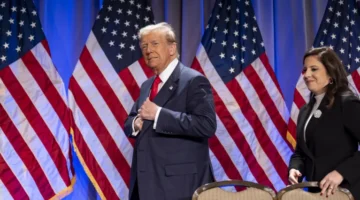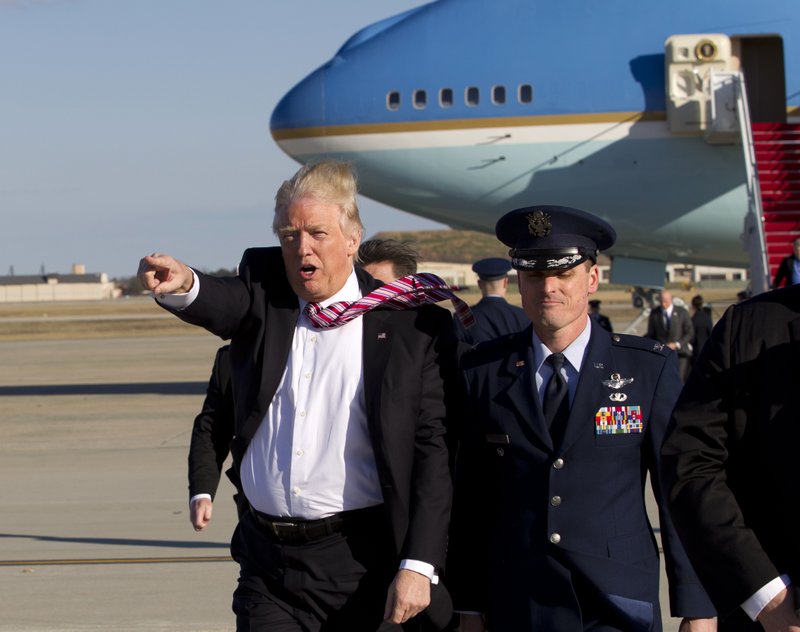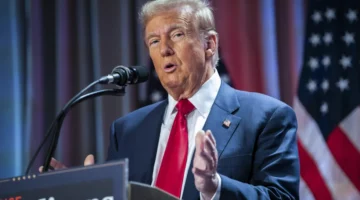Trump proposes big import tax, triggering fight with Mexico
WASHINGTON (AP) — Determined to wall off America’s border with Mexico, President Donald Trump triggered a diplomatic clash and a fresh fight over trade Thursday as the White House proposed a 20 percent tax on imports from the key U.S. ally and Mexican President Enrique Pena Nieto abruptly scrapped next week’s trip to Washington.
The swift fallout signaled a remarkable souring of relations between Washington and one of its most important international partners just days into the new administration. The U.S. and Mexico conduct some $1.6 billion a day in cross-border trade, and cooperate on everything from migration to anti-drug enforcement to major environmental issues.
At the heart of the dispute is Trump’s insistence that Mexico will pay for construction of the massive wall he has promised along the southern U.S. border. Trump on Wednesday formally ordered construction of the wall.
The plan was a centerpiece of Trump’s election campaign, though he never specified how Mexico would fund the project or how he would compel payments if Pena Nieto’s government refused.
The two leaders had been scheduled to discuss the matter at the White House next week. But Pena Nieto took to Twitter Thursday to say he had informed the White House he would not be coming.
In a speech in Philadelphia later Thursday, Trump cast the cancellation as a mutual decision. He said that “unless Mexico is going to treat the United States fairly, with respect, such a meeting would be fruitless, and I want to go a different route. We have no choice.”
On the flight back to Washington, Trump’s spokesman told reporters the president was considering the 20 percent import tax to foot the bill, the most specific proposal Trump has ever floated for how to cover a project estimated to cost between $12 billion and $15 billion.
“By doing that, we can do $10 billion a year and easily pay for the wall just through that mechanism alone,” Spicer said. “This is something that we’ve been in close contact with both houses in moving forward and creating a plan.”
Spicer said Trump was looking at taxing imports on all countries the U.S. has trade deficits with, but he added, “Right now we are focused on Mexico.”
But the announcement sparked immediate confusion across Washington, and the White House tried to backtrack. During a hastily arranged briefing in the West Wing, chief of staff Reince Priebus said a 20 percent import tax was one idea in “a buffet of options” to pay for the border wall.
A 20 percent tariff would represent a huge tax increase on imports to the U.S., raising the likelihood of costs being passed on to consumers. Half of all non-agricultural goods enter the U.S. duty free, according to the office of the U.S. Trade Representative. The other half face import tariffs averaging 2 percent.
Mexican Foreign Relations Secretary Luis Videgaray said Thursday, “A tax on Mexican imports to the United States is not a way to make Mexico pay for the wall, but a way to make the North American consumer pay for it through more expensive avocados, washing machines, televisions.”
Mexico is one of America’s biggest trade partners, and the U.S. is the No. 1 buyer from that country, accounting for about 80 percent of Mexican exports. A complete rupture in ties could be damaging to the U.S. economy and disastrous for Mexico’s. And major harm to Mexico’s economy would surely spur more people to risk deportation, jail or even death to somehow cross the border to the U.S. — undercutting Trump’s major goal of stopping illegal immigration.
House GOP lawmakers and aides interpreted Spicer’s comments on a 20 percent border tax as an endorsement of a key plank of their own tax plan, which Speaker Paul Ryan has been working to sell to the president. The House GOP “border adjustability” approach would tax imports and exempt exports as a way of trying to help U.S. exporters and raise revenue.
Earlier this month, Trump called that concept confusing. And during the White House’s clean-up efforts Thursday, Spicer wouldn’t say whether Trump agreed with the border adjustment tax being considered by the House GOP.
The new president has previously raised the prospect of slapping tariffs on imports, but had not suggested it as a way to pay for the border wall.
There’s also disagreement within his new administration over the effectiveness of tariffs in general. Wilbur Ross, Trump’s nominee for commerce secretary, dismissed tariffs for trade negotiations during his confirmation hearing, saying the 1930 Tariff Act “didn’t work very well then and it very likely wouldn’t work now.”
Pena Nieto has faced intense pressure at home over his response to Trump’s aggressive stance toward his country. Until this week, Mexico had tried its traditional approach of quiet, cautious diplomacy combined with back-room discussions, sending Cabinet officials for talks with the Trump administration.
But that changed when Trump decided to announce his border wall on Wednesday — the same day that two senior Mexican Cabinet ministers arrived in Washington for preliminary talks ahead of what was to be a presidential tete-a-tete. Many Mexicans were affronted by the timing, and Pena Nieto faced a firestorm of criticism at home.
The diplomatic row recalls the rocky days of U.S.-Mexico relations in the 1980s, prior to the North American Free Trade Agreement, a pact that Trump has vigorously criticized.
“There is a change in the understanding that had been in operation over the last 22 years, when Mexico was considered a strategic ally,” said Isidro Morales, a political scientist at the Monterrey Institute of Technology and Higher Education. “Trump has unilaterally broken with this way of doing things.”
___
Stevenson reported from Mexico City. AP writers Josh Boak, Stephen Ohlemacher and Jonathan Lemire contributed to this report.
___
Follow Julie Pace at http://twitter.com/jpaceDC







No Comment